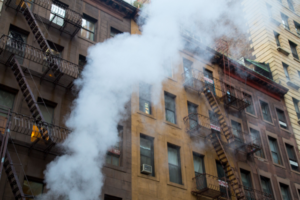According to FEMA, there are over 16,500 fires in non-industrial businesses per year, and over 37,000 industrial and manufacturing fires per year. Taking a proactive approach to fire prevention is essential to protecting your employees, business, building, and the surrounding community. This includes knowing the top fire hazards for your industry, how to safeguard against common hazards, and when to dispatch fire watch services.
It doesn’t matter what industry you’re in, you must comply with Local Fire Code. If you’re in a multi-tenant building, much of the fire safety plan falls on the building, but not all. For example, the building is responsible for installing a fire detection, prevention, and suppression system. It’s your job to ensure your employees know their evacuation routes and how to conduct low-risk internal operations. You must also report building violations, such as blocked exits.
1. Electrical Fire Hazards
Approximately 7% of commercial business fires are due to electrical hazards. With the rise in computerized office gadgets, rechargeable technology, and smart technology, even small businesses and office buildings have an increased risk of overloading their circuits.
An electrician can inspect your setup to ensure you’re using the correct extension cords and power strips and that you’re not overloading your outlets. They’ll also inspect your building and individual circuit breakers and electrical components to ensure everything is up to code and advise if upgrades, including GFCIs and AFCIs, are required to protect against electrical faults.
When hiring IT professionals to upgrade your IoT or install smart technology, always inquire if they’re proficient in ensuring that you have the proper outlets and that outlets aren’t overloaded.
When to Dispatch Fire Watch?
Have a fire and hazard assessment completed at least once per year that includes an inspection by a certified electrician. Minor upgrades to electrical work typically don’t require fire monitoring, but schedule our services during hot work and major electrical upgrades. Evacuate, turn electrical off, and call for emergency monitoring and repair at any sign of electrical overload.
2. Flammable or Combustible Materials
Don’t think you have any flammable or combustible materials in your business? Almost every business has cleaning supplies, most of which are potential fire hazards. Other everyday flammables and accelerants include office furniture, textiles, cardboard boxes, and paper you haven’t got around to shredding.
If you process hazardous waste or use and store hazardous materials, proper storage and handling are required. This includes short-term use for maintenance and repairs. Even the placement of your outdoor employee smoking area should be strategically placed away from flammable interior and exterior materials.
When to Dispatch Fire Watch?
If you use or store high volumes of hazardous materials, our services may be required 24/7. If use is short-term, schedule us as-needed.
3. Heating and Cooking Repairs
Every business utilizes some sort of heating mechanism, all of which must be properly maintained and operated. In addition to your HVAC system, even the most basic of kitchens and lunch rooms have at least a few fire risks. This includes the microwave, coffee maker, dishwasher, cooktop, and grease trap. These items must be properly installed and regularly maintained.
Even if you own or operate a small office with only a few appliances in your lunch room, you need to be mindful that appliances are plugged into the proper outlets, used properly, and regularly maintained. In an office setting, microwaves and coffee makers are used more frequently. So schedule inspection and maintenance 2 to 4 times a year, and you may want to upgrade to commercial appliances for safety and durability.
When to Dispatch Fire Watch?
If there’s a gas leak, immediately evacuate, alert other tenants in the building, call the gas company (or 911), and schedule repair and fire watch. If the repairs require hot work or turning off your water, we monitor and patrol.
4. To Fulfill Regulatory Requirements
You’ll also need to dispatch our services when:
- Your fire alarms or suppression system is down.
- When the water is out in your building for more than 4 hours.
- During hot work or other spark or smoke-producing work.
- When you have an event that attracts large crowds.
- To comply with industry, insurance, OSHA, or local Fire Code.
Also Read:
- Fire Watch Duties vs. Security Guard Duties
- How to Choose a Fire Watch Company
- Deploying Certified Fire Watch Guards as Part of Your Fire Prevention Plan
- Special Event Fire Watch Responsibilities and Requirements
- Workplace Fire Safety: OSHA Fire Protection & Prevention Safety Training
We’re Available 24/7 in Denver and The Springs
We understand that emergency fire hazards arise at any time of day or night. Pre-schedule when you know risk is high or any time an unexpected fire risk arises.




